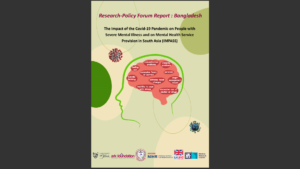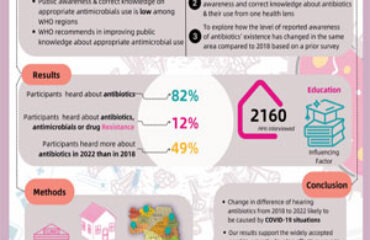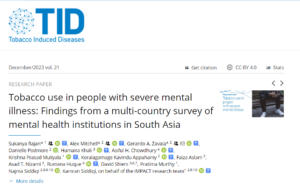 The Impact of the Covid-19 Pandemic on People with Severe Mental Illness and on Mental Health Service Provision in South Asia (IMPASS) Research-Policy Forum Workshop in Bangladesh was held on 20th June, 2022, organized by IMPASS research team at ARK Foundation in partnership with National Institute of Mental Health (NIMH). Prof. Rumana Huque, Executive Director, ARK Foundation hosted the workshop along with Dr. Helal Uddin Ahmed, Associate Professor, National Institute of Mental Health (NIMH).
The Impact of the Covid-19 Pandemic on People with Severe Mental Illness and on Mental Health Service Provision in South Asia (IMPASS) Research-Policy Forum Workshop in Bangladesh was held on 20th June, 2022, organized by IMPASS research team at ARK Foundation in partnership with National Institute of Mental Health (NIMH). Prof. Rumana Huque, Executive Director, ARK Foundation hosted the workshop along with Dr. Helal Uddin Ahmed, Associate Professor, National Institute of Mental Health (NIMH).
Diverse group of stakeholders (22 participants) including policy makers, clinicians, researchers and academicians attended the workshop from Public, Non-Government, Development Partner’s organizations.
IMPASS Project
Severe mental illnesses (SMI) are chronic disorders (e.g. schizophrenia, bipolar disorder), which may cause considerable impairment in ability to engage in functional and occupational activities, affecting around 1% of the population, globally. Eighty percent of the SMI people die due to physical illnesses while SMI lowers life expectancy by ~10-20 years.
The IMPASS project aimed to investigate and help mitigate the impact of the Covid-19 pandemic and its response (e.g. lockdown and social distancing) on people with SMI and on mental health service provision in Bangladesh. Using our existing research collaborations and infrastructure, including a current SMI research cohort, we conducted:
- Surveys of people with SMI
- Semi-structured telephone interviews with patients, families and mental healthcare workers (in each country)
- Mental health facility surveys
- Joint stakeholder workshops, to present emerging findings, receive feedback and iteratively codesign survey/interview questions, ensuring they are responsive to the evolving pandemic and policy context
- Reviews of the literature on vaccination in people with SMI
Prof. Dr. Rumana Huque, Executive Director ARK Foundation did the presentation on IMPASS study.




